
About Andrew Cusack
 Writer, web designer, etc.; born in New York; educated in Argentina, Scotland, and South Africa; now based in London.
Writer, web designer, etc.; born in New York; educated in Argentina, Scotland, and South Africa; now based in London. read more
News
Blogs
Reviews & Periodicals
Arts & Design
World
France
Mitteleuropa
Knickerbockers
Argentina
The Levant
Africa
Cape of Good Hope
Netherlands
Scandinavia
Québec
India
Muscovy
Germany
Academica
Engelsman se Graf

It was just a dot and a name on the map on our way to Wupperthal — Englishman’s Grave, “Hmmm… I wonder what that could be”. The Cederberg mountains have many charms, and of course any one who drinks as much rooibos tea as I must be intrigued to see the only place in the world where it is commercially grown. Leopards, caracals, and bonteboks guard these hills, and of course our friend the dassie (previously seen here) is known to wander around its rocks.
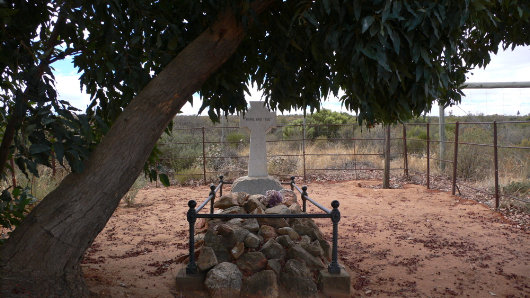
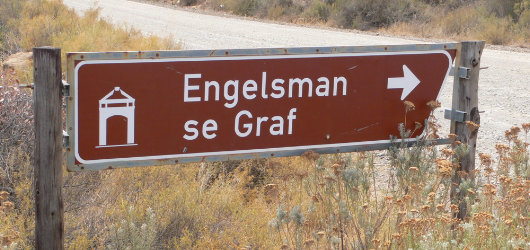 The lonely tomb sits beneath the protective shade of a guarding tree. Lt. Graham Vinicombe Winchester Clowes was killed in a skirmish with Boer commandos January 30, 1901 and buried here. He and his men had arrived in South Africa in just enough time to join in the Battle of Magersfontein. It had been thought that the Boers were encamped on the massive Magersfontein koppie. Three miles away, the Highlanders camped and waited for the early morning light to attack.
The lonely tomb sits beneath the protective shade of a guarding tree. Lt. Graham Vinicombe Winchester Clowes was killed in a skirmish with Boer commandos January 30, 1901 and buried here. He and his men had arrived in South Africa in just enough time to join in the Battle of Magersfontein. It had been thought that the Boers were encamped on the massive Magersfontein koppie. Three miles away, the Highlanders camped and waited for the early morning light to attack.
Advancing on the point having just marched through a pounding thunderstorm, the men’s advance was interrupted by a terrific sound, described by one as the sound of a dam bursting: the crack of thousands of Boer rifles. The commando was not encamped on the prominence, but in a camouflaged trench a hundred feet in front of it. The British suffered over 900 casualties that day, to just 200 Boer dead, and the British advance stopped dead in its tracks.
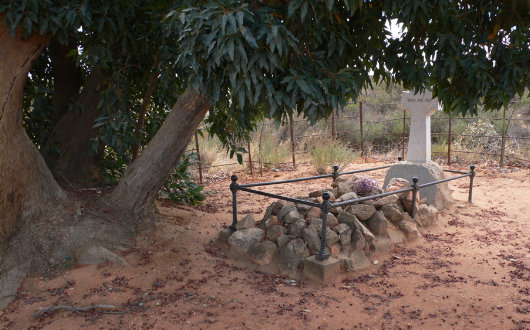
Lt. Clowes survived the horrors of Magersfontein but was then killed a year later in the small-scale actions in which the Boer commandos were particularly skilled. Devastated by the death, his mother travelled from Hertfordshire to have the gravestone constructed and placed. For many years after Lt. Clowes’s death, his mother would make the five weeks’ journey by sea to the Cape to make the pilgrimage to her son’s grave on the anniversary of his death in the searing heat of the January sun. The day we visited a sprig of fynbos rested on the soldier’s grave, so someone must remember Lt. Clowes still, or at least have the Christian decency to honour his memory.
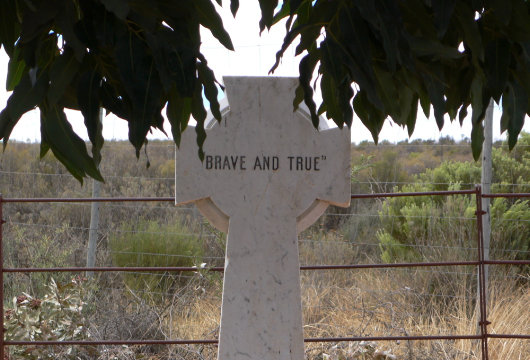
IN SACRED AND LOVING MEMORY OF
GRAHAM VINICOMBE WINCHESTER CLOWES
LIEUTENANT
1st BATTN THE GORDON HIGHLANDERS
SON OF THE LATE WINCHESTER CLOWES OF HITCHIN HERTS.
KILLED IN ACTION NEAR THIS SPOT ON 30TH JANUARY 1901
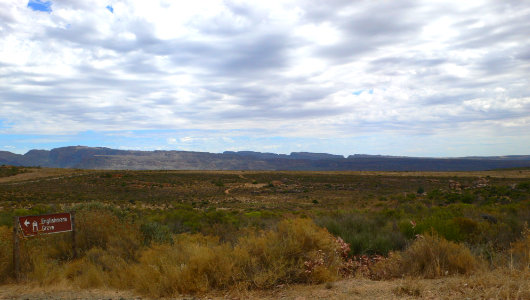
At least Lt. Clowes has a splendid view from his resting place.
Search
Instagram: @andcusack
Click here for my Instagram photos.Most Recent Posts
- Sag Harbor Cinema March 26, 2025
- Teutonic Takeover March 10, 2025
- Katalin Bánffy-Jelen, R.I.P. March 3, 2025
- Substack Cusackiensis March 3, 2025
- In the Courts of the Lord February 13, 2025
Most Recent Comments
Book Wishlist
Monthly Archives
Categories



Deeply moving; a poignant tale, and a perfect spot for bittersweet memories to unfold.
Poor lady!
I visited the Anglican church in Bishop’s Stortford in England where Cecil Rhodes was baptised. On the walls were plaques commemorating worthy departed parishoners. Although I have forgotten the name of the young soldier on it and his age, one plaque remained fixed in my memory. The young man, mourned by his grieving family, had died in a fight with the baSutho at Thaba’nchu in the late 1800’s and his body is buried there. I have been to Thaba’nchu. It is dry, harsh and wild. The same sense of poignancy I think you felt at this lonely grave in Wupperthal overcame me. This young man had grown up surrounded by the gentle green fields of Herfordshire and died on a hard, dry Lesotho mountain overlooking the endless sunburnt plains of the Orange Free State. Splendid as the skies are over that part of Africa, it seemed such a lonely alien place for an English boy to lie forever.
I felt exactly what David Allen describes – a lonely, dry place for a 21 yr old young man to be buried. How sad! And then I read Emily Hobhouse’s biography. Always 2 sides to every story – especsially WAR! All part of our history YES, but all those senseless deaths!
Driving through the Cedarberg Mountains, knowing the war that took place all those years ago! I actually stood on sacred ground, where many lives were lost! My goodness!!!
SAD, yes, on both sides. WAR is NOT ‘nice’ and it is sad reading entries like these – of any human who died unnecessary. The greediness of the British took over – how unnecessary was that! How many women and children died [unnecessary] in concentration camps. I can go on and on – even about British soldiers like this soldier. It must have been ‘n ‘boer’ who left the ‘sprig of fynbos’ – as it was said the Boers treated the English in a kind way during the war [and I assume after as well.] :)
Thank you for this post. Lt. Graham Vinicombe Winchester Clowes was my grand-father’s first cousin. I would’ve never have known about “Englishman’s Grave” without your information. Your beautifully written blog and photos really brought this story to life. Again thank you.
Tip’s post has renewed my interest in this case, and I immediately found a mystery of sorts; certainly an error in the common account.
The poor boy’s father had died in 1900, leaving a large estate for the period – £81,000.
But his wife had died in 1894, and he did not marry again.
Thus whoever it was who visited his grave was neither mother nor stepmother – a sister maybe?
Perhaps Tip, as a member of the family, can solve this little conundrum for us.